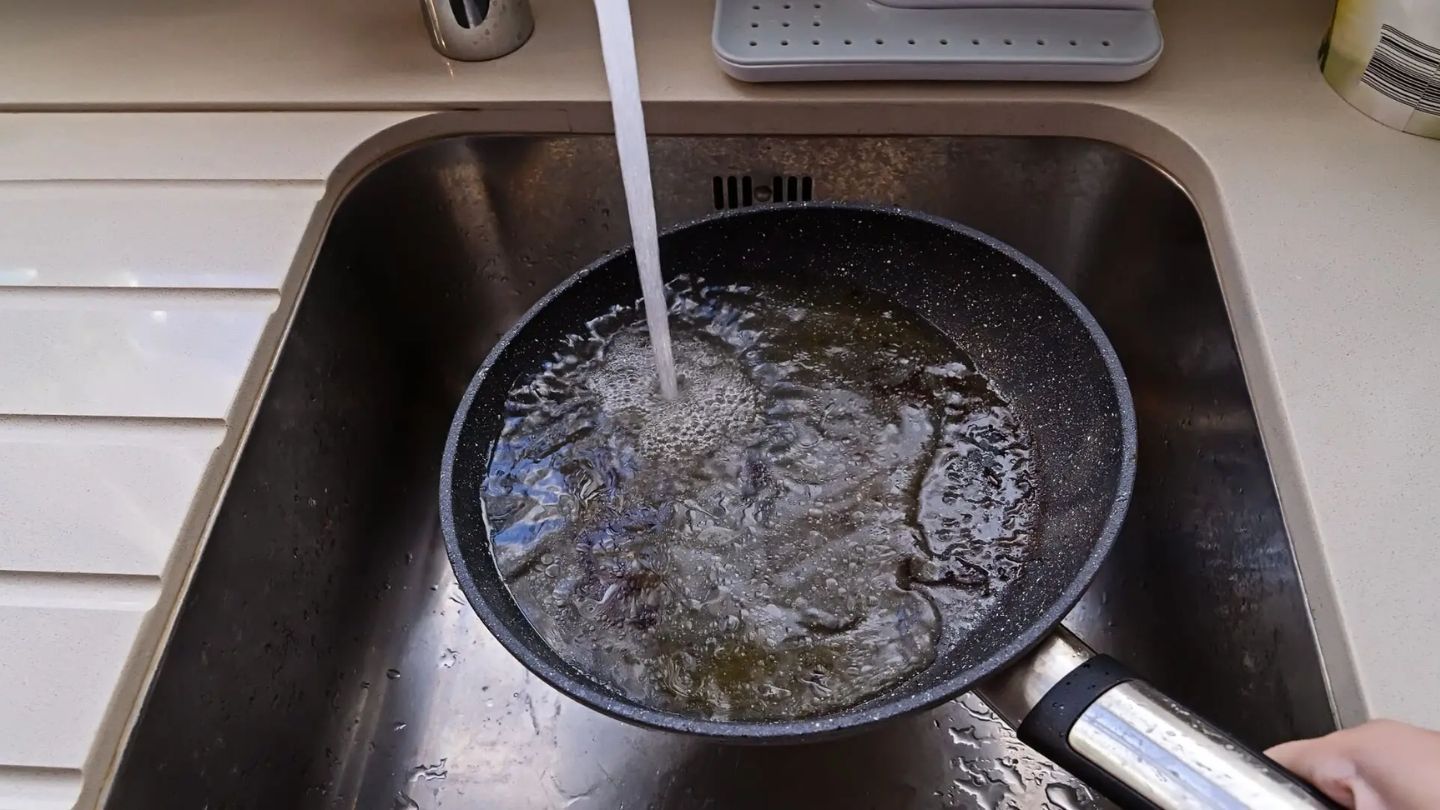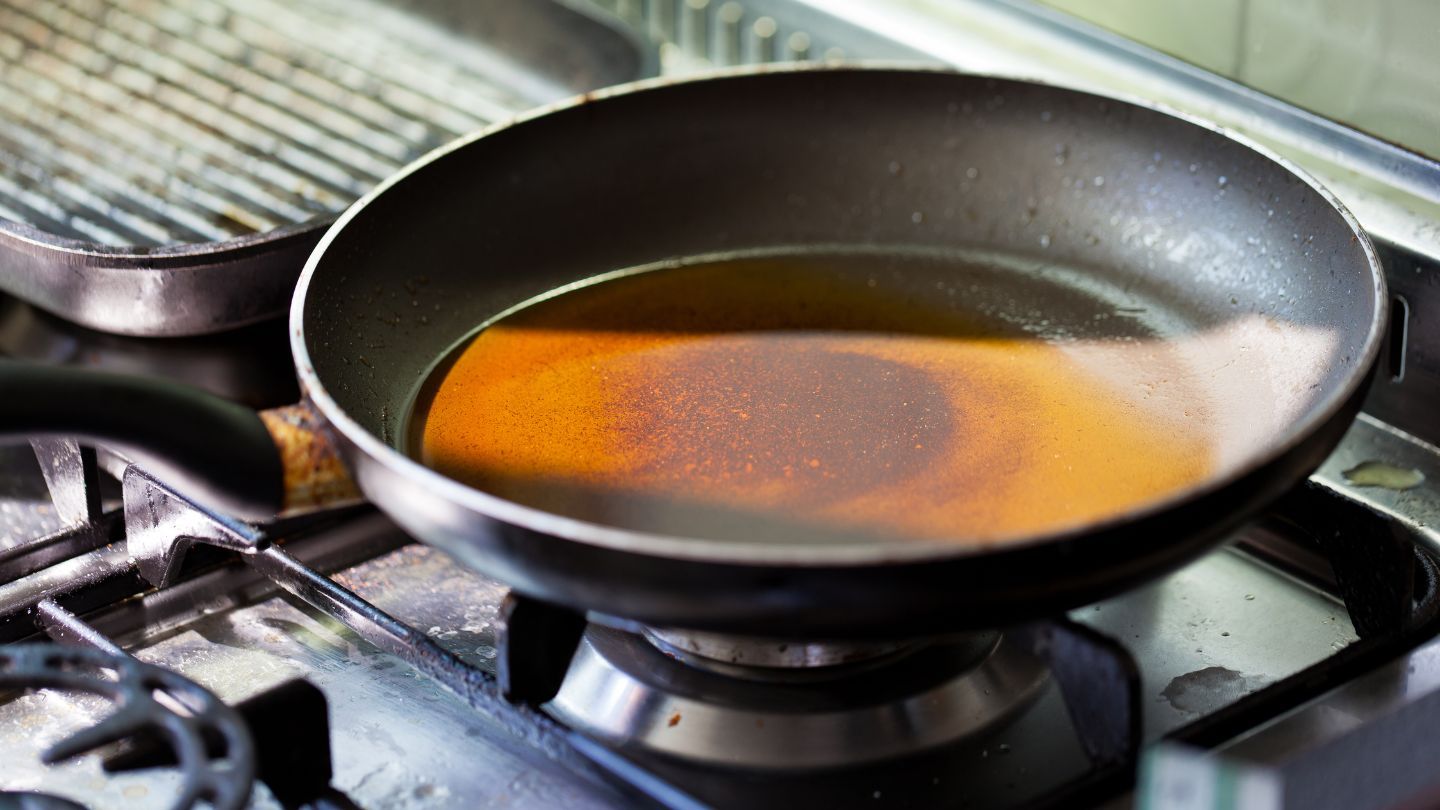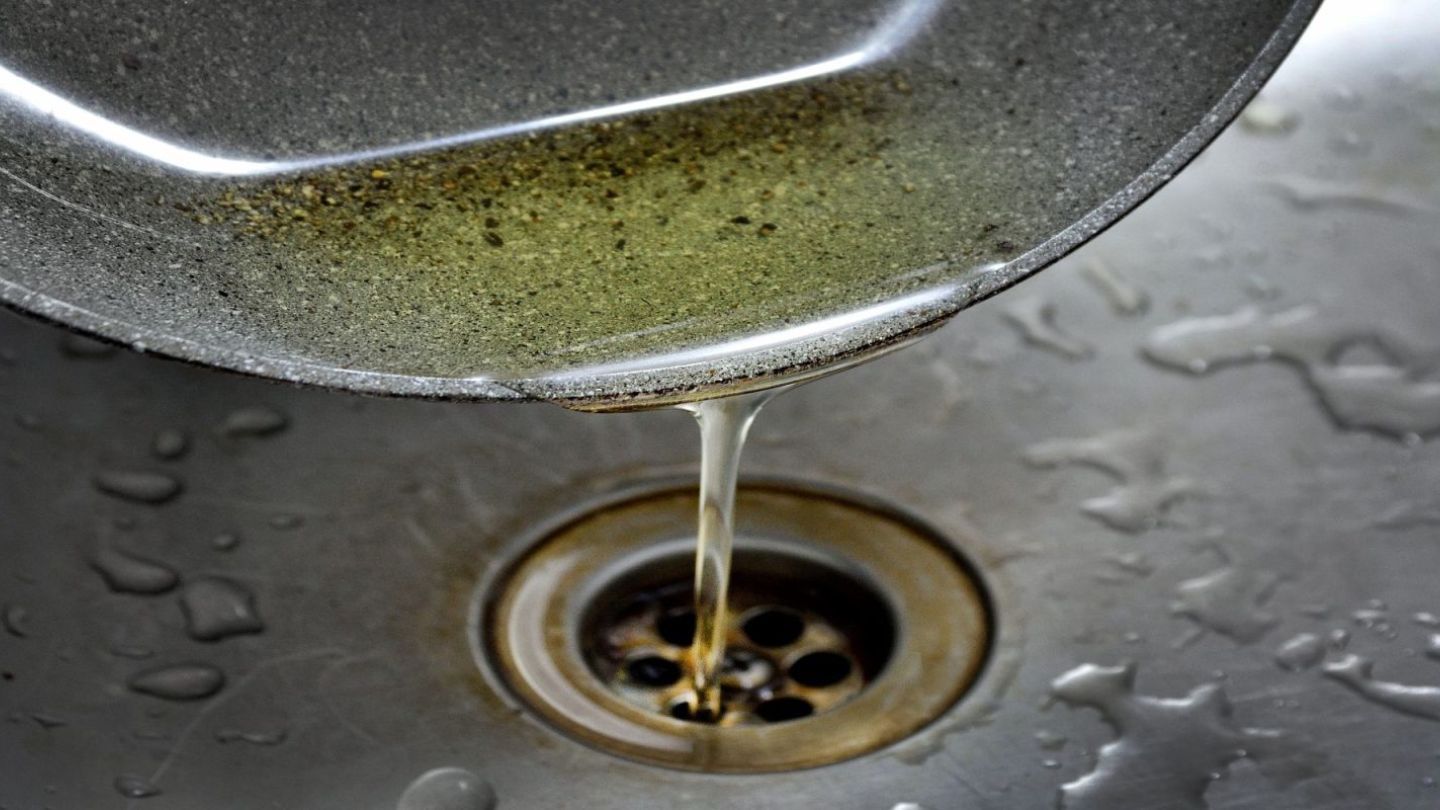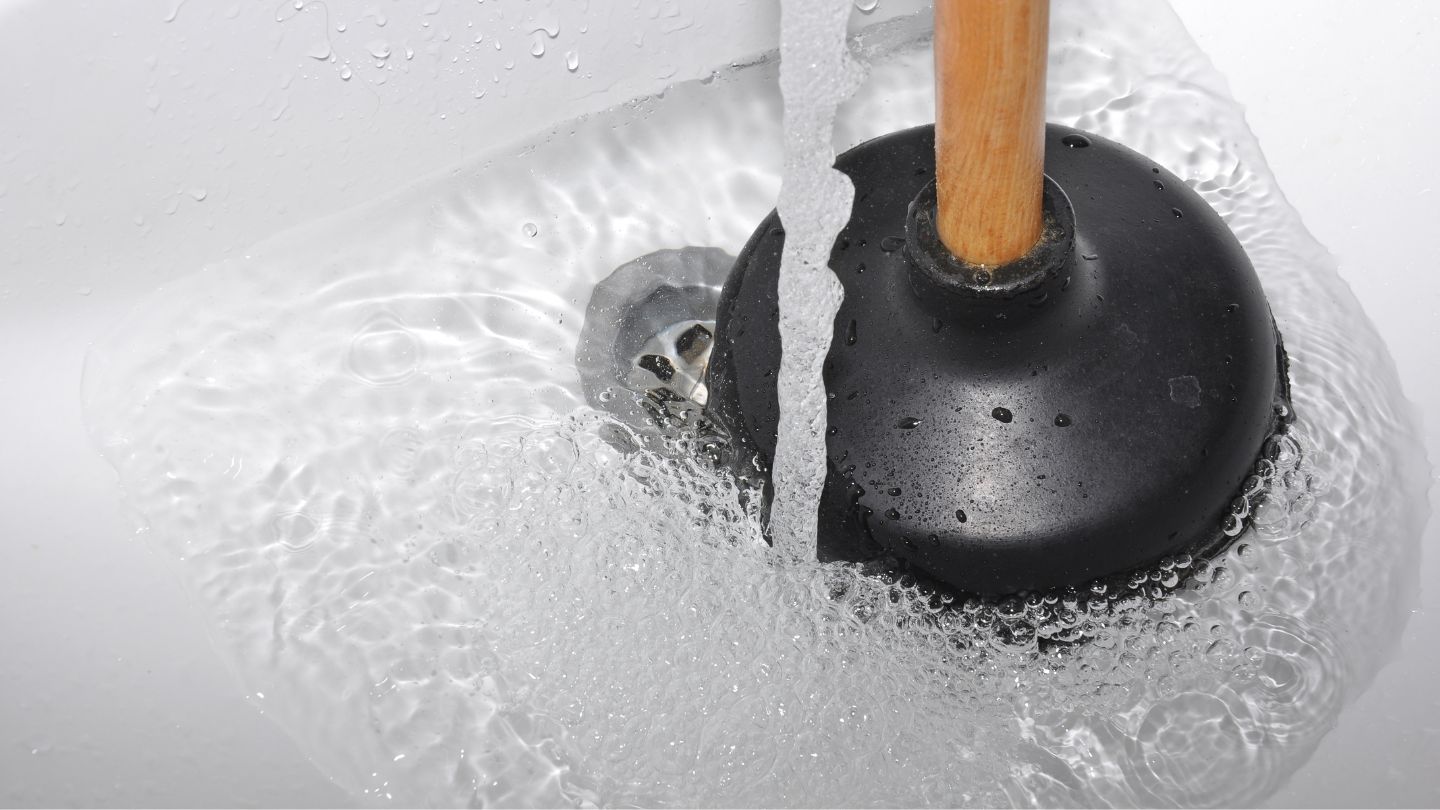Can you
pour grease down the drain? The short answer is no. Pouring grease down the
drain can cause serious plumbing issues and even damage your municipal sewer
system. This article will explain why it's harmful and show you safer ways to
dispose of grease.
Key Takeaways
- Pouring
grease down the drain can lead to severe plumbing issues, including
solidified clogs and costly repairs.
- Proper
disposal methods for cooking grease include sealing it in containers for
trash disposal, reusing it, or recycling it for biofuel conversion.
- Communities
must collaborate to prevent grease clogs, as improper disposal affects
municipal sewer systems and environmental health.
The Dangers of Pouring Grease Down the Drain

Disposing
of cooking grease by pouring it down the kitchen sink is a widespread practice,
yet it often results in significant plumbing complications. The notion that
dish soap or hot water will avoid clogs when combined with grease is incorrect.
As the grease cools, it becomes solid and clings to pipe walls, leading to
blockages and subsequent plumbing issues. Adding dish soap and hot water into
the mix can exacerbate disruptions in your home's drainage flow and potentially
cause substantial damage to your entire plumbing system, necessitating
expensive repairs.
It isn't
just an issue within one's personal residence—grease travels beyond individual
pipes into broader municipal systems where it poses greater hazards. Once
there, congealed cooking fat mingles with other detritus, creating large
obstructions known as 'fatbergs', which can choke off sewer lines entirely,
resulting in severe community-wide problems. Grasping these risks underlines
why vigilance against such practices is crucial for safeguarding both
residential property infrastructure as well as communal sewage networks.
Comprehending
how disposing of cooking oil improperly could lead not only to blocked drains
but also negatively impact the wider municipal sewer system empowers homeowners
toward preventive behavior. By expanding our understanding of these
consequences, we underscore better methods for managing waste fats—and ensuring
their appropriate disposal preserves our collective piping infrastructures
safely intact.
How Grease Clogs Your Pipes
When hot
cooking grease is poured down the drain, it may appear to be a non-issue
initially. But as this substance cools, it can transform into hard blocks
within your plumbing system, disrupting water flow. These solidified lumps of
grease lead to backups and can progress from slow drainage issues to severe
clogs that might require costly repairs.
The
presence of even minimal amounts of grease in your pipes creates a tacky
surface that attracts food particles and other debris. This process is
exacerbated when you continue to pour grease into the drain, facilitating the
adhesion of these substances, which increases the likelihood of blockages
forming over time.
The
accumulation from repeatedly disposing of cooking oil or any form of
kitchen-based fat through drains will eventually become substantial enough to
impede smooth water circulation inside your home's piping network. To safeguard
against such obstructions and maintain clear conduits throughout your plumbing
framework, refrain from draining cooking fat directly into sinks.
Impact on Municipal Sewer Systems
The
ramifications of disposing of grease improperly reach well beyond the confines
of a single home and impact the entire municipal sewer system. Within these
sewers, grease transitions into fatty acids and glycerol when it breaks down.
These acids combine with calcium to create substantial blockages known as
fatbergs, which can obstruct an entire section of sewer piping. The emergence
of such obstructions leads to significant disruption within the plumbing
infrastructure, necessitating extensive efforts for remediation.
To tackle
issues stemming from grease accumulation in pipes, cities allocate millions
annually towards clearing clogs and ensuring consistent maintenance of their
sewage systems. Fatberg formation is not just a nuisance but also poses risks
by potentially causing untreated wastewater spills that lead to ecological harm
and health dangers.
Recognizing
how our habits concerning disposal affect broader sanitary services enables us
to comprehend why adopting correct measures when managing grease is crucial for
safeguarding both residential properties and community welfare at large.
Safe Methods for Disposing of Cooking Grease

Understanding
the perils associated with pouring cooking grease into the drain is essential,
prompting us to consider appropriate disposal techniques. This holds true for
all forms of cooking oils, including bacon grease and other kitchen greases.
Numerous strategies exist that enable individuals to dispose of leftover
cooking grease without damaging their home's plumbing infrastructure or harming
the environment. By adhering to these practices, we not only safeguard our own
drains but also support the well-being of the broader municipal sewer system.
To
appropriately discard used grease, one might first allow it to cool down and
then transfer it into a container that can be securely sealed before being
placed in regular garbage. Alternatively, you have options such as repurposing
or recycling your spent oil. Actions that serve both your immediate needs and
environmental conservation efforts.
We will now
delve deeper into comprehensive guidelines on how best to manage waste from
various types of kitchen oils - focusing on methods for its safe elimination,
potential reuse opportunities available within households, and avenues through
which one can recycle this substance responsibly.
Trash Disposal
Before
discarding cooking grease, ensure it has cooled and become solid. Once cool,
transfer the grease to an empty jar or can with a lid and dispose of it in your
trash bin. To minimize the amount of grease entering your sink, use paper
towels to wipe off greasy cookware prior to washing them.
If you have
hot grease that needs to be disposed of immediately, consider pouring it into a
heat-resistant glass container secured with a lid. Wait for the grease to cool
down and turn solid before tossing it out with your household waste.
Alternatively,
line a bowl with parchment paper and pour the hot grease into this lining. When
the fat cools sufficiently, wrap up the now-solidified substance in plastic
film or another bag securely for disposal. This practice is vital in
maintaining clog-free plumbing by avoiding any accumulation of fats within
drain pipes.
Reusing Cooking Oil
Managing
leftover cooking grease can be done effectively by repurposing used cooking
oil. Ensuring the longevity and reducing waste of such oils is possible through
proper storage measures. The ideal approach involves placing them in an
airtight container within a cool, dark environment, which aids in preserving
the oil's integrity and prevents it from spoiling.
Prior to
reutilizing cooking grease, it's imperative to perform a rancidity test by
giving it a sniff. Should you detect any unpleasant or sour aromas from the
oil, it would be prudent to dispose of it rather than risk using spoiled
grease. Adhering to these straightforward guidelines will allow for repeated
use of your cooking oils across various meal preparations while economizing and
conserving resources efficiently.
Recycling Cooking Oil
Opting to
recycle cooking oil is a choice that supports environmental sustainability by preventing
grease from clogging the sewer system. To prepare for recycling, it's essential
to eliminate any food particles present in the used oil first. Afterward,
ensure you place the filtered oil into containers that are both dry and clean
in order to preserve its suitability for being recycled.
There are
several drop-off points within many localities or select eateries where
individuals can contribute their collected cooking oil for recycling purposes.
This reclaimed substance has potential utility as a biofuel—offering an
eco-friendly alternative energy option while simultaneously minimizing overall
waste output.
Engagement
with programs dedicated to the recycling of cooking oils reinforces efforts toward
fostering an ecologically sound atmosphere and assists significantly in
preventing grease-related blockages within our sewer infrastructure.
What To Do If You Already Poured Grease Down the Drain

Should you
find yourself having poured grease into the drain, remain calm, as there are
prompt actions that can be taken to minimize harm and avert additional issues
with your plumbing. It's crucial to respond swiftly before the grease sets and
creates a significant blockage. Everyday items such as dish soap and boiling
water could serve as makeshift remedies for slight obstructions.
When
confronted with more tenacious clogs, it might become necessary to resort to
making your own drain cleaner or enlisting the services of an expert plumber.
Detailed guidance on how to manage small-scale grease-induced clogs in your
home's plumbing will be provided, along with advice on when professional
assistance should be sought.
Using Boiling Water and Dish Soap
Pouring
boiling water down the drain is a practical approach to melting grease and
removing small obstructions. The heat from the boiling water increases the
temperature of the grease, enabling it to move through pipes with less
resistance. Introducing dish soap into the drain prior to adding boiling water
can aid in emulsifying the grease, facilitating its removal.
Employing
this tactic may provide an immediate remedy for minor accumulations of grease
within your home's plumbing. Nevertheless, bear in mind that this should be
seen as a provisional measure rather than a long-term solution. Consistent use
of hot water coupled with dish soap could assist in preserving your plumbing
system. It doesn't replace the correct methods for disposing of grease.
When to Call a Plumber
Pouring
grease down your kitchen sink can lead to significant plumbing issues over
time. To tackle the core of persistent grease blockages, it may be necessary to
enlist professional plumbing services. A Total Plumbing offers sophisticated methods
such as hydro jetting and motorized augers that efficiently eradicate tough
grease clogs, ensuring your plumbing system operates smoothly once again.
When
domestic solutions fall short in remedying these problems, reaching out for
expert plumbing assistance is crucial in order to prevent more extensive damage
to your plumbing infrastructure and sidestep expensive repairs. Should you
encounter recurring obstructions or a slow-draining sink, do not hesitate to
contact a plumber for assistance.
Read more: When Should You Call a Plumber for a Clogged Toilet?
Community Efforts to Prevent Grease Clogs

To
safeguard our sewer system from grease-induced clogs, a collaborative effort is
essential among residents, businesses, and the broader community. Such teamwork
helps to ensure that blockages do not occur in the sewers, thereby preserving
public infrastructure. It's vital for each homeowner to take care of their
drains by stopping grease from contributing to obstructions within both their
personal plumbing and the wider communal sewage network.
Disposing
of grease improperly can be detrimental to our sewage and plumbing systems,
with repercussions that extend throughout local communities. Left unchecked,
accumulations like fatbergs have the potential to force untreated sewage out
through manholes. This could lead to substantial environmental damage as well
as serious health hazards.
Recognizing
how one's actions regarding grease disposal affect others may inspire
individuals to adopt improved habits that align with collective initiatives
aimed at averting clogging issues within our shared sewer infrastructure.
Local Initiatives Supported by A Total Plumbing
A Total
Plumbing is a steadfast advocate for local charitable endeavors that enhance
the welfare of the community. Collaborating with entities such as Frank Ski
Kids and Toys for Tots, A Total Plumbing plays a pivotal role in nurturing
communal solidarity while offering support to individuals who require aid.
Engaging in these activities not only advocates for proper grease disposal
methods, but also uplifts the general standard of living within the community.
Participation
in regional projects underscores A Total Plumbing's dedication to serving its
community. When you join these initiatives, you become an active agent in
avoiding grease-related blockages within our plumbing systems and help foster a
more pristine and salubrious environment that benefits all residents.
Summary
In
conclusion, pouring grease down the drain can lead to significant plumbing
problems and costly repairs. Understanding the dangers of grease disposal and
adopting safe methods for disposing of cooking grease can protect your home's
plumbing system and the municipal sewer system. Whether you choose to dispose
of grease in the trash, reuse it, or recycle it, taking the right steps can
prevent clogs and contribute to a cleaner environment.
A Total
Plumbing, specializing in plumbing installations in
Acworth, is here to support you with all your plumbing needs, from addressing
existing clogs to providing expert advice on proper grease disposal practices.
By working together, we can keep our homes and communities free from
grease-related plumbing issues. Remember, responsible grease disposal is a
small step that makes a big difference.

